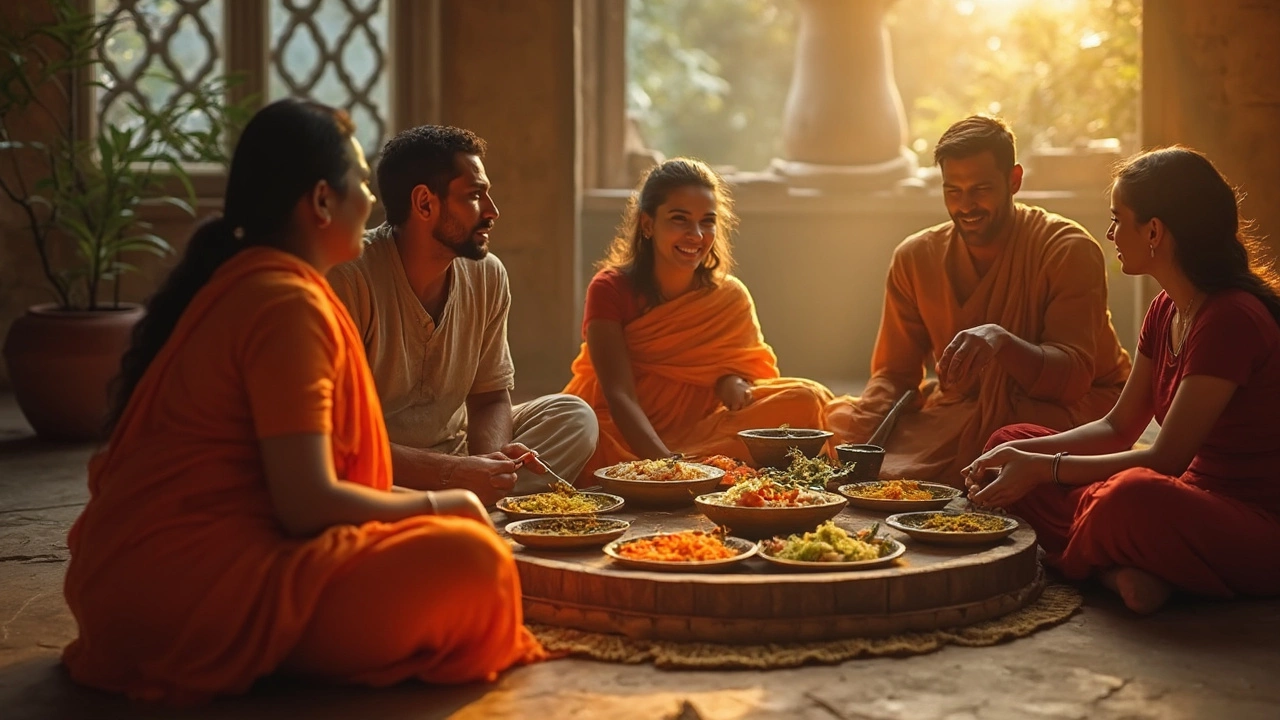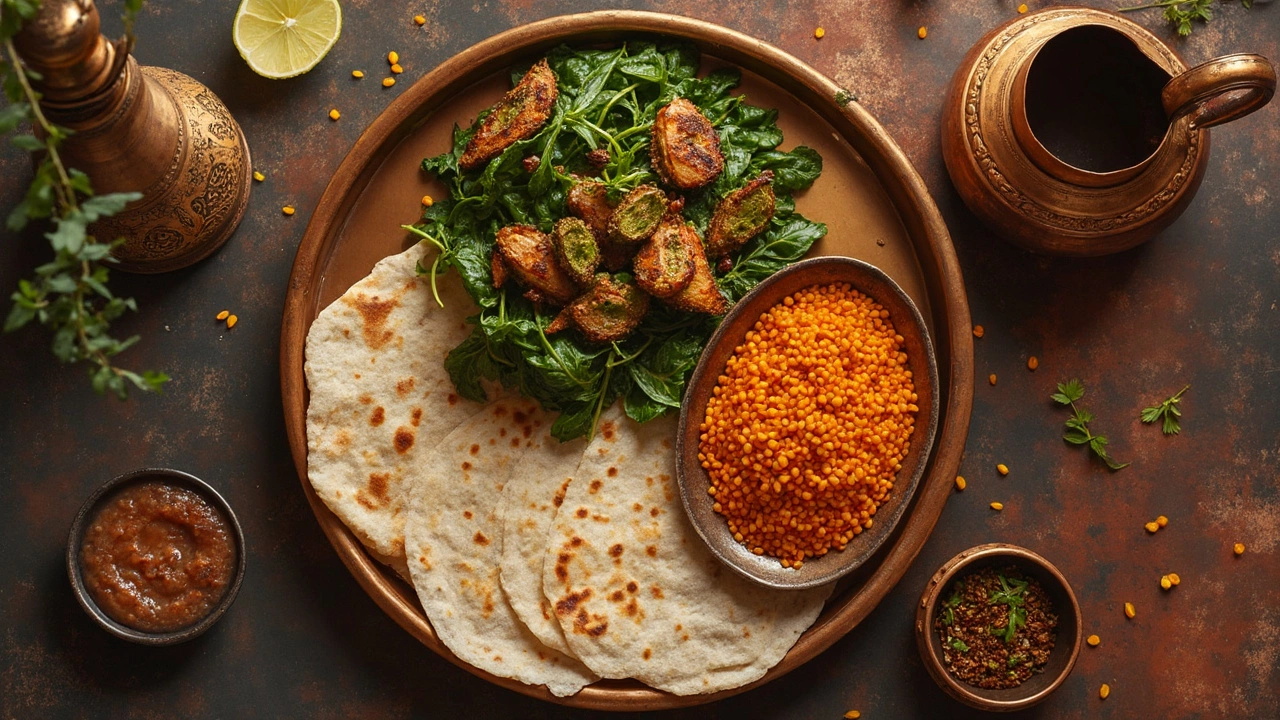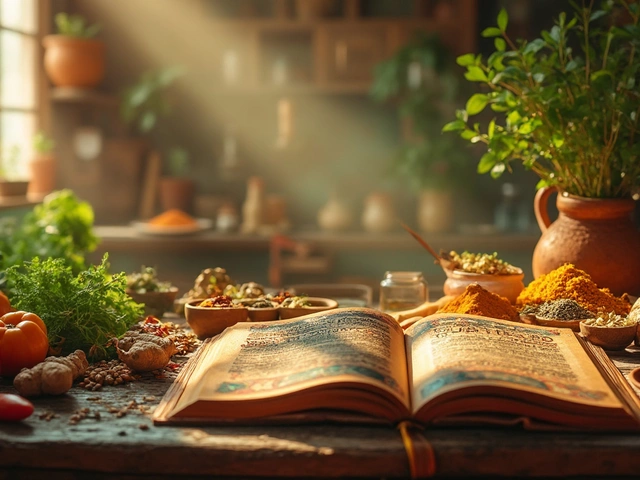
Ever wondered why you feel bloated or restless after a late, heavy dinner? According to Ayurveda, it’s not just about what you eat—timing and how you eat make a huge difference. Think of your digestion like a campfire. The flames are mellow by evening, not roaring like at noon. That means your body won’t handle large or oily meals well at night, and your sleep will pay the price.
Ayurveda recommends keeping dinner light and easy to digest. Soups and cooked veggies usually top the list. Ever notice you sleep deeper after a simple meal like khichdi (a mix of rice and lentils)? That’s not a coincidence; the body spends less energy on digestion, freeing you up for rest and repair. Stick around to see how you can tweak your dinner routine for better sleep and smoother mornings—you’ll wonder why you didn’t do it sooner.
- Why Timing Matters More Than You Think
- What Should Actually Be on Your Plate
- Tailoring Your Dinner to Your Dosha
- Ayurvedic Don’ts: What to Avoid at Night
Why Timing Matters More Than You Think
Most people don’t realize that the time you eat dinner is almost as important as what’s actually on your plate. Ayurveda says your digestion is strongest in the middle of the day—pretty much when the sun is at its highest. By evening, your digestive fire, what Ayurveda calls 'Agni,' slows down and gets weaker.
If you eat late—think after 8 pm—your body struggles to process heavy foods. This can mean bloating, weird dreams, and even grogginess in the morning. Research done by the All India Institute of Medical Sciences shows that people who finish dinner before 7 pm have fewer stomach issues and even sleep better compared to those who eat later.
Ayurveda recommends having your evening meal two to three hours before bed. This gives your body time to get through digestion before it needs to rest. People who eat earlier often report better sleep and less discomfort—especially if they stick with easy-to-digest meals.
- Ideal dinner time: 6 to 7 pm
- Avoid eating past sunset whenever possible
- Go for a lighter meal; save heavy stuff for lunch
To make things super clear, here’s what usually happens with late dinners versus early ones:
| Timing | Digestion | Sleep Quality | Common Next-day Effects |
|---|---|---|---|
| Before 7 pm | Easy, smooth | Restful, deep | Energetic, clear-headed |
| After 8 pm | Slow, heavy | Restless, light | Bloating, sluggishness |
The bottom line? Schedule your Ayurveda dinner earlier and lighter, and your gut (and mood) will thank you every morning.
What Should Actually Be on Your Plate
When it comes to an Ayurveda dinner, simplicity is your best friend. Ayurveda says your dinner should be the lightest meal of your day, so forget those heavy curries, greasy meat, and thick breads at night. Your digestive fire—what they call "agni"—slows down in the evening. Pile on the rich stuff, and you’re just asking for trouble like indigestion or poor sleep.
Your plate should focus on cooked foods, not raw salads. Cooked vegetables, simple grains, and easy-to-digest proteins are the staples Ayurveda stands by. Soup made from lentils, carrots, spinach, and a hit of warming spices like ginger or cumin is classic. Another go-to is khichdi—a comforting mix of rice and mung dal. It’s filling but never heavy, and it pairs perfectly with some steamed veggies or a bit of yogurt if your body handles dairy well.
Here's a quick cheat sheet for what works best:
- Cooked grains: rice, millet, or quinoa
- Steamed or sautéed vegetables: squash, spinach, carrots, green beans
- Legumes: mung dal, split lentils (not the heavier beans like kidney beans)
- Light soups: vegetable or dal-based
- A small dollop of ghee—Ayurveda loves this clarified butter for making food nourishing but not greasy
- A spoonful of fresh chutney for flavor and digestion
If you eat animal protein, keep it to mild white fish or eggs, but Ayurveda usually leans toward plant protein at night. Avoid cheese, deep-fried snacks, and cold foods. Cold stuff just shuts down digestion when your body already wants to slow down.
Check out how different foods impact your evening digestion:
| Food Group | Effect on Digestion (Dinner Time) |
|---|---|
| Cooked rice | Light, easy to digest |
| Cold salads | Harder to digest, can cause bloating |
| Fried foods | Very heavy, often leads to sluggishness |
| Lentil soup | Gentle, nourishing, helps sleep |
| Chapati/roti | Okay in moderation, but avoid loaded with ghee |
Stick to warm herbal teas like cumin or fennel after your meal if you want to boost your digestion and wind down. It may sound simple, but making these swaps can make your evenings way more comfortable and your sleep much deeper.

Tailoring Your Dinner to Your Dosha
Ayurveda doesn’t do one-size-fits-all advice. It says your body type, or dosha, should shape what you eat for dinner. The three main doshas—Vata, Pitta, and Kapha—have their own quirks and special needs. If you’re not sure about your dosha, you can take a well-known online quiz or check with an Ayurvedic practitioner. Here’s how your choice of foods can seriously boost how you feel after dinner and the next day.
The basic idea: the right foods help balance your dosha, while the wrong ones can leave you feeling sluggish, moody, or even mess with your sleep. Keeping that in mind, let’s break it down:
- Vata types—thin, quick-moving, sometimes anxious or chilly—do best with warm, moist, and grounding meals. Think soups with sweet potatoes, rice, and cooked carrots. Stay away from raw salads and beans at night, which can be too rough on their sensitive digestion.
- Pitta types—intense, strong-willed, tend to run hot—need cooling, soothing foods. Try simple grains, steamed veggies (like zucchini or squash), and avoid anything too spicy or oily. Heavy meats and fried food can crank up their inner fire, triggering heartburn or irritation.
- Kapha types—steady, calm, might gain weight easily—should go for light, dry, and spicy meals. Roasted veggies, barley, and a sprinkle of warming spices (like ginger or black pepper) are great picks. Skip dairy-heavy or super oily stuff at night, since it can lead to that heavy, sluggish feeling in the morning.
Here’s a quick-hit table to keep it all straight:
| Dosha | Best Dinner Foods | Foods to Avoid |
|---|---|---|
| Vata | Soups, stews, rice, cooked vegetables, healthy oils (like ghee) | Raw salads, beans, crackers, processed snacks |
| Pitta | Steamed veggies, couscous, quinoa, sweet fruits | Spicy dishes, tomatoes, fried foods, excess meat |
| Kapha | Grilled or roasted veggies, barley, light soups, pungent spices | Cheese, creamy sauces, oily and heavy meals |
Don’t stress about being perfect. It’s about shifting your dinner plate just a bit to bring your body into balance. If you ever feel super heavy or restless at night, try adjusting what’s on your plate according to Ayurveda dinner basics—you’ll probably notice a difference within a week.
Ayurvedic Don’ts: What to Avoid at Night
This is where stuff really gets interesting—Ayurveda isn’t shy about calling out foods you should skip at dinner. A lot of so-called "healthy" options just don’t cut it during the evening hours.
First one: skip heavy, oily, or fried foods. These weigh your stomach down and mess with your sleep. Ayurveda is pretty clear that big feasts and rich dishes are better left for lunch, when your digestion can actually handle them. Cheese-loaded pizza or a greasy burger for dinner? Hard pass if you want to wake up feeling good.
Dairy can also be a problem. While a warm glass of milk is sometimes suggested to help with sleep, things like cold yogurt or cheese are seen as heavy and can build up mucus. For people who notice sinus issues or grogginess in the morning, dairy at night might be to blame.
Another big one: leftovers. In Ayurveda, food starts to lose its prana (life energy) after it’s cooked. That means yesterday’s takeout or day-old rice isn’t just less nutritious, it can feel "dead" to your system and cause sluggishness. Super practical tip—cook just what you’ll eat for dinner, especially if you’re serious about following a Ayurveda dinner routine.
Raw veggies, salads, and ice-cold foods are also on the don’t list. Your digestion isn’t strong enough at night to break down raw stuff, so even big salads can end up making your system work overtime. Ayurveda also says cold foods put out the digestive "fire" that you actually need for a good night of rest and repair.
- Avoid eating after 8pm; late meals typically get stuck in your system.
- Say no to dessert—sugary foods in the evening spike blood sugar and disrupt sleep.
- Watch out for beans and heavy lentils; these are tough to digest late in the day unless they’re cooked super soft and with spices.
The wildest part? Ayurveda says to avoid going to bed angry or stressed. Your emotional state actually messes with your digestion too. So, keep dinner simple, light, and avoid the drama—your gut and your sleep will thank you.





Rohan Talvani
I am a manufacturing expert with over 15 years of experience in streamlining production processes and enhancing operational efficiency. My work often takes me into the technical nitty-gritty of production, but I have a keen interest in writing about medicine in India—an intersection of tradition and modern practices that captivates me. I strive to incorporate innovative approaches in everything I do, whether in my professional role or as an author. My passion for writing about health topics stems from a strong belief in knowledge sharing and its potential to bring about positive changes.
view all postsWrite a comment